Preview: A Quiet Passion
Howard Chae finds Terence Davies’ latest as subtle and delicate as Emily Dickinson’s poetry

As funny as it is thought-provoking, Terence Davies’ meticulously crafted A Quiet Passion retells the short and tragically uneventful life of Emily Dickinson. Replete with the acerbic repartee one would expect to find in Downton Abbey, the biopic is set in nineteenth-century Massachusetts and stars Cynthia Nixon as the reclusive poet. It couldn’t seem further removed from the “shallow and narcissistic and sexually venal” world of HBO’s canonical Sex and the City, in which Nixon plays the assertive high-flying lawyer Miranda Hobbes (and which, ironically, Davies happens to detest).
“Replete with the acerbic repartee one would expect to find in Downton Abbey”
Nevertheless, one cannot help but note the thematic resemblance between the two as the film opens with the teenaged Emily (played by Emma Bell) calmly but brazenly disavowing the rigid teachings of the seminary institute she attends briefly before withdrawing. Further parallels between Emily and the freethinking modern woman Miranda embodies in Sex and the City seem to emerge when she procures her father’s approval to stay up at night to write poetry, thus beginning her life as an artist, and also when she confides to the similarly outspoken and mischievous Vryling Buffam (Catherine Bailey) her reluctance to get married.
It would be a mistake, though, to regard A Quiet Passion as the simplistic transplantation of Sex and the City into a historical setting. While Miranda revels in her individuality, Emily’s confines her in an emotional straightjacket as she begins to buckle under the weight of social convention, with all of its gendered expectations and hypocrisies. She loses the sole outlet of her artistic passions and personal frustrations – the publication of her poetry in the Springfield Republican – when the paper’s editor cruelly decides that he has had enough of her improper insistence that he refrain from amending her work. And scolded by her sister, Lavinia (Jennifer Ehle), for her obsessive but unrequited infatuation with the married Reverend Wadsworth, Emily is infuriated by the adulterous exploits of her brother, Austin (Duncan Duff), whose indiscretions are not met with similar moral disapproval.
“Davies brilliantly uses the set to articulate Emily’s sense of alienation from a patriarchal society unwilling to accommodate women’s individuality”
Nixon’s superb rendition of Dickinson is complemented by Davies’ breath-taking cinematography. Rarely venturing outside the Dickinsons’ family home (and later, Emily’s room), Davies brilliantly uses the set to articulate Emily’s sense of alienation from a patriarchal society unwilling to accommodate women’s individuality and creative spirit through her hermitic physical isolation. Dispersing Nixons’ recitals of Dickinson’s poems throughout the soundtrack heightens viewers’ emotional engagement, as does Davies’ imaginative visual language – Dickinson’s momentary vision of Death himself approaching as she waits in agony to succumb to her terminal kidney disease poignantly captures the tragedy of a life unfulfilled.
And although the constant flow of one-liners at times seems forced or excessive, the tone of A Quiet Passion as a whole is carefully considered and restrained. A wry humour accompanies the ever-present themes of otherness and death, confronting viewers with the deeply unsettling and yet resonant contradiction of a remarkable woman whose literary legacy persists to this day, reduced by custom and circumstance to an insignificant victim of patriarchal domination
 News / CUP announces funding scheme for under-represented academics19 December 2025
News / CUP announces funding scheme for under-represented academics19 December 2025 News / SU reluctantly registers controversial women’s soc18 December 2025
News / SU reluctantly registers controversial women’s soc18 December 2025 News / Cambridge welcomes UK rejoining the Erasmus scheme20 December 2025
News / Cambridge welcomes UK rejoining the Erasmus scheme20 December 2025 Features / Should I stay or should I go? Cambridge students and alumni reflect on how their memories stay with them15 December 2025
Features / Should I stay or should I go? Cambridge students and alumni reflect on how their memories stay with them15 December 2025 Film & TV / Timothée Chalamet and the era-fication of film marketing21 December 2025
Film & TV / Timothée Chalamet and the era-fication of film marketing21 December 2025









